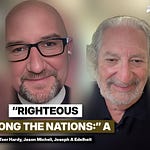Hi Friends,
Glad Advent!
Here is the second installment of a conversation I enjoyed with my mentor and muse, Fleming Rutledge, a few years back.
The transcript is below, but here is the prayer she prays at the end of our time together:
Almighty God, give us grace to cast away the works of darkness and put on the armor of light. Now in the time of this mortal life in which your Son Jesus Christ came to visit us in great humility, that in the last day when he shall come again in his glorious majesty to judge both the living and the dead we may rise to the life immortal. Through him who lives and reigns with you and the Holy Spirit, one God, now and forever. And oh Lord, on this day, as many people hear these words, grant to us the power to discern your works in the midst of us and to go where you are, where you are, on the frontier between Satan and all his works and the oncoming future of the God who is able. In His name, God, Father, Son, and Holy Spirit, we pray. Amen.
Let me talk about white preaching for a minute.
It took me years and years and years to learn to get myself and my own concerns out of the way. I was a convert out of the segregated South and being converted by Martin Luther King's dream speech live. I saw it live. I'm that old. I was a young mother in Richmond, Virginia and my black housekeeper who came once a week to clean the house was in the house. And something prompted me to say, come on in here, you might like to hear this. So the two of us watched live the dream speech. And all I'd ever heard was that Martin Luther King was a communist. People don't realize that. We were taught in the South that Martin Luther King was a communist. And so were a lot of other people in the civil rights movement, because they had gone to a camp in South Carolina, I can't remember, or North Carolina, I can't remember the name of it, it's a very famous socialist camp, and therefore communist and wicked. And a lot of the civil rights movement received teaching from that camp that people went to learn about social action. During the Dream speech, live, I emphasize live, I had never, no one had any idea what he was going to say. I certainly didn't. You can't recreate this astonishment of hearing that lie. Well, it completely changed me 100%. I became an advocate of civil rights after that and lost some of my friends and upset my family. And so I was very self-righteous. I had seen the light and all you people out there in the pews, you haven't seen the light. Actually, I hadn't been ordained then, but I hate to think of the tone of my sermons that I've been preaching during those days. The self-righteousness of it is the thing that's so threatening to the gospel.
Now I tell the same stories over and over. I'd love to have some new stories, but I can't change the stories of how I was transformed. I've often referred to Will Campbell, who I only met in life once. I communicated with him frequently, but we didn't meet in person except once in New York City, of all places. He with his famous black hat on and walking down Fifth Avenue, as I recall it, with Will's black hat looking very odd. And I told him that my father was a racist and he said, Fleming, we're all racists. Not many people would have the authority to say that. Yeah, yeah. Will Campbell is one of the very few people who have the authority to say that. That has shaped me ever since. I began as a self-righteous convert to social action and social causes and I belonged to a church that set itself over against the other churches in town in that regard, making me even more self-righteous. But then as I moved out into the larger church and became more mature and saw more clearly the racist feelings and just general bad feelings in nature, in general about people and things that happen, recognizing in myself this tendency to privilege myself over other people.
But that began to shape my preaching over a long time though. It took a long time, long time, took about 15 years really for me to come to understand that above all, we want people to hear themselves included in whatever promise we're making. We want the people in the pew not to feel threatened, but to feel the sense of God working for good in them, working from inside them. Is that where justification as declaration and justification as rectification intersect? The idea that God is doing things in you despite you? Absolutely. The only way I know to help people see this is to tell a story. The story should not dominate the sermon. The text should dominate the sermon, but the story can illustrate the thrust of the text.
I do have a lot of examples stored up, but I think the one that people will most readily recognize is the way that the members of the church in Charleston were prepared, long years of preparation, prepared to look at him, what's his name, in the eye, say, I forgive you. That is such an overwhelming thing to witness.
I think it would have to be a very cold-hearted Christian who would not feel some movement of the spirit upon hearing that. We need, and I have, I just am not remembering them right now, I have a lot of other examples, I have a whole file on forgiveness and the way that forgiveness changes the situation in people's hearts. I use these examples not just to urge people to forgive each other but as vehicles through which I hope the spirit will move, however inchoate a way to see beyond and through the hateful feelings of the moment and the hateful realities of the moment, to see beyond them and through them to what God is able to do. That's another favorite saying in the black church is that God is able. I've never heard that before until a black nurse in the hospital said it to me when my father was sick. And I was upset because I thought my father wasn't going to be able to come to my ordination. This nurse looked at me right now and said, God is able. And I never heard that before. It has stayed with me ever since. It speaks of God's power. It speaks of God's promise. It speaks of God's ultimate purpose. As it turned out, my father was able to come to my ordination.
But if not, the Lord is still able.
The Lord can do things that we cannot even imagine.
That's in Ephesians, power, things that we cannot even ask or imagine God is able to do. The task of the preacher is to try to convey that promise and that power in a way that will not simply make people feel hectored or judged or exhorted, but the stirrings inside of maybe this is even happening to me. Maybe God is able even to change my heart. Maybe God is changing my heart. Maybe God will change my heart. Speaking directly to the promise that every person can seek, avoiding exhortation, avoiding the kind of, we are called to do this language that preachers use all the time. We are called to do this, that, and the other. But people don't feel called to do it. The people that are called to do it are already doing it. The people that are sitting in the congregation feeling discriminated against or exhorted to do things that they don't feel that they can do or don't want to do, they're the ones that we should have foremost in our minds when we preach. We want to preach for their liberation. And in doing so, I'm preaching for my own liberation.
The congregation and the preacher are in the same boat. The water's rising all around us, but the water's not just rising for the righteous or to swallow up the unrighteous. We're all the unrighteous. When the preacher's not doing that, it's not really the gospel. It's a form of exhortation, which only works when it's in the context of the gospel. That's very important to remember about Paul. People are always saying,
Well, but Paul uses language of exhortation all the time. Yes, he does, but he never does it unless it is embedded in the uniquely Pauline proclamation of the power of God to make right what has been wrong. There's a reason the exhortation usually come at the end of the letter. That's very true with the word therefore preceded. There's the word therefore, therefore. You're the one who taught me to make that distinction between hortatory and proclamation. And I don't know that anyone learns it.
Well, I wouldn't know it either if I hadn't been taught it over and over and over again at Union Seminary of all places. Over and over and over again. And it didn't click in until about 15 years later. I know people get tired of me beating that horse now, but since you helped me make that distinction, I see it everywhere. Yes. And so the sort of basic rule, if you want to speak about rules, I've really done it I guess, but the basic guideline.
in preaching in that regard is, are you using the imperative or the indicative? Are you telling people what they ought to be doing? Or are you showing them, yes, this might even be possible for me. God being my helper. God being my helper, anything might be possible for me, but only God being my helper, not human possibility.
I was taught by Lou Martin never to use the word possibility in connection with God. That's why the black community doesn't say all things are possible with God, although of course Jesus says that, and I'll go back to that, but they say God is able. The context of Jesus saying all things are possible with God is very important because it's preceded by with men, with human beings, it is impossible.
We use the term possibility thinking to talk about human possibility. Jesus says all things are possible with God. He is contrasting that sharply and directly with human possibility, with human potential. The language of human possibility and human potential does not belong in Christian theology. It's the possibility of God. It's the potential, potens strength. It's the potentiality, the strength the power of God that is the subject of the sermon. And the best black preachers know that. They may not know it in those words, but they know it because they do it. The good black preaching is empowering more than it is anything else. The dream speech was empowering. My Lord, it empowered me for my life. It raised me out of my sinkhole of segregationists to a completely new vision of what God would do. It's about what God is doing. It's not Martin Luther King exhorting us to be better. He is seeing God's future, and he's bringing us into it. I'm getting choked up here because it's recovering that emotion I felt when I listened to it. You can't recreate that today because we've all heard the sermon a thousand times.
And we haven't heard it in its original context where he starts talking about bringing the uncashed check to the government. It starts out quite political, but I've heard very often and I think it's true that after he went on like that for a while, Mahalia Jackson, who was sitting behind him said, Martin, do the dream. And he sailed into that like a ship caught by a wind. He hadn't planned it, I'm told. It was so a great movement of the Spirit. Ideally, preaching should always be like that. It won't be world historical like that. But we should hope for and ask for and pray for the Lord to use our preaching, blow the wind of the Spirit into our preaching so that people will be caught up. But here's where the word dream fails us. It's been used a lot today. It's become common. Two Episcopal presiding bishops in a row have used the word dream, really with God.
Constantly. And Michael Curry, who is very admirable in many ways, Michael Curry talks about the dream of God too. When Martin Luther King says, I have a dream, it's not a hortatory use of the word. It's a vision. It's an eschatological vision, an apocalyptic vision. The curtain is drawn back. It's like the great story in 2 Kings where the servant of Elisha looks out of the besieged city and sees chariots of fire and horses of fire all around the city. And he says, those that are with us are more than those that are with them. The unseen hosts of God, the horses and the chariots carry Elijah into heaven. The unseen heavenly host of God. Martin Luther King really did, I think, for us, he drew the curtain aside and revealed to us the horses and chariots. He saw like Moses, I've seen the mountaintop. I haven't been there, but I've seen it. And you want your people to see it too. That's the thing. You aren't calling them to go out and do something. You're calling them to see. Apocalyptic transvision, I call it, to see through the realities of today, including the realities of our own imprisoned souls, spirits, psyches, to see through that into what we will be. As in 1 John, little children, it does not appear what we shall be, but we shall be like him. That doesn't yet appear, but it appears apocalyptically, that is to say it appears proleptically in the sermon. When Martin Luther King gave his last sermon the night before he died and he said, I've been to the mountaintop, I may not get there, I won't get there, but I've seen it.
It's much more powerful than I'm remembering. You have to have the exact cadence that he uses when he talks about, I'm not fearing any man, and he was going to be killed by a man the next day. I said, I'm not fearing any man because I've seen what God is going to do. It's not just God's dream. It's what God's going to do. See, that's the difference. When you talk about God having a dream, it makes it sound as if the dream can't come true unless we do something.
That's not the way it works. The dream, I don't even like to talk about the dream of God. The promise of God, the purpose of God, that is already coming to pass. And it comes to pass in these little things that people do that are, by God's grace, redemptive. So in the sermon, we want to give lots of examples over the years of preaching that we do. Lots of examples in which something redemptive happens in people in spite of themselves.
All of that is very, very much Advent, living according to the promise. The book of Revelation, I suppose you could say the book of Revelation is like seeing the dream, but that's different from saying that God has a dream. That's not the same thing as saying, I've seen the dream. In a sense, the book of Revelation is like that. In Revelation, God permits us to see through the suffering of the present time into what we shall be by His power. By my spirit, says the Lord, not by any human power, but by my spirit, says the Lord. I get kind of carried away myself when I talk about these things, because this is what empowers me to keep going. There are plenty of times that I just don't think I have it anymore. You do. I have to preach several times in the coming two months, and I'm very worried that I don't have it anymore. So I'm glad to have a chance. But I like to have new examples. I do keep telling these same stories over and over because they were so powerful in my own life, but I want people to see these things happening in their life. I want people to have experiences like hearing Martin Luther King live. There are things being said now live that we need to hear. I think we live in a time that is choking on self-righteousness. Yeah, the church is very guilty of this, I'm afraid probably is that we have two churches that sort of existing alongside each other, not speaking to each other. We have the liberal, so-called liberal churches who emphasize social action and speak of specific issues all the time. And part of me wants to do that. But we have this other church in which preachers never even mention anything that's going on in the news, never even mention it, partly because they're afraid of their parishioners, I realize that, but also, and perhaps more important, because they're not used to thinking this way. They're used to thinking in this boxed off environment where the Bible speaks, but it's as if the Bible speaks only in a certain voice. And once you stray outside that voice into current events, people seem to be afraid that they're going to lose the voice of God. But I was very fortunate. I was trained in a tradition that's different from what many people are facing as choices now most people are facing choices if they want to be trained to preach they can go into a seminary or an environment whether it's online i'm against online learning but anyway if you're an environment where everything is exhortation then that's what you'll learn to do if you're living in an environment where social justice issues are never brought up but only personal sin, then that's what you're gonna learn to do. But I was so fortunate, but I was trained in an environment where it was everything, including social justice issues, was seen through the gospel. And in context of the gospel, I just was so blessed in that regard because I had these teachers, Paul Layman, Lou Martin, Raymond Brown, Cyril Richardson, Edmund Steinway, Samuel Terrien, names that are colossal names, but that people don't, people always want a heart back to Ronald Niebuhr and Paul Tillich, but those are not the best names in my education. I was taught, trained by people who could see all of this at once through the lens of the scripture. Personal sin, adultery, and social sin, races all through the lens of the scripture, all judged by God.
All of us judged by God, all of us, no matter how much we're on the barricades, we too are judged by God. And we too, we too are objects of God's love and God's justification. Is that what the church does at Advent? Does it say, God's judgment is coming and we'll go first? I need you at my right hand all the time. That's exactly what God is saying in Advent and always, but Advent is such a good opportunity. But you know when you're not in a church that a liturgical church and you're not, and I'm speaking here to your listeners, whoever they are, when you're in a liturgical church it's much easier to do Advent. I think it would be very difficult to do Advent in the way that I'm talking about if you have never been in a church where Advent is observed in a very special way and where the lectionary is not used.
I have mixed feelings about the lectionary, and if I had to do over again, I would do a lot more preaching just from specific books. But on the other hand, the way that the lectionary unfolds the meaning of the church year, and Advent in particular, is very precious. And I was formed by that, no question. It would have been more difficult for me to come to terms with Advent, well, for Advent to come to terms with me, if I had not been in a liturgical church.
So I want to caution my listeners out there, Jason's and my listeners, those of you who are not in liturgical churches and are not used to Advent. Advent is not about putting on a purple stole. Advent is not about an Advent wreath. Advent is not about an Advent calendar. All of those things are nice, but Advent is theological. It is about probing into the heart of a great number of passages associated with the season and meditating on and reflecting on and working on for sermons the passages of judgment that are used in the season of Advent. And I'm talking now about Advent seven weeks, not just four weeks. This is becoming more and more understood. You have to go back to All Saints Day. That's when Advent really begins with the readings in the Lectionary about judgment and the movement toward the Day of Judgment.
And then John the Baptist comes in Advent and more judgment, but also this beginning of the expectation, the promise. But it's not really oriented so much toward Christmas until the last week. It's oriented to the last things. Death, judgment, heaven, and hell. The four last things of Advent. Well, Fleming, speaking of last things, I need to depart here. And I was wondering if you could pray us out.
I forgot about that. I was going to ask you if I could just, for those of you who are not in the Episcopal Church, I would like to read to you the great Advent prayer. Just a minute. That's great. This is the prayer that everyone in my tradition grew up with during Advent. We used to read it every Sunday in Advent and at all the weekday services too. I don't know why they changed that, and I wish they hadn't, because hearing it every Sunday and every evening prayer and every morning prayer, it really, you memorize it. Let us pray.
Almighty God, give us grace to cast away the works of darkness and put on the armor of light. Now in the time of this mortal life in which your Son Jesus Christ came to visit us in great humility, that in the last day when he shall come again in his glorious majesty to judge both the living and the dead we may rise to the life immortal. Through him who lives and reigns with you and the Holy Spirit, one God, now and forever. And oh Lord, on this day, as many people hear these words, grant to us the power to discern your works in the midst of us and to go where you are, where you are, on the frontier between Satan and all his works and the oncoming future of the God who is able. In His name, God, Father, Son, and Holy Spirit, we pray. Amen.













